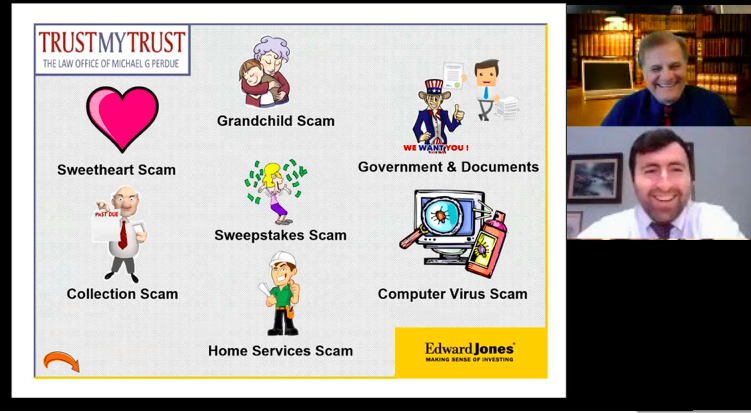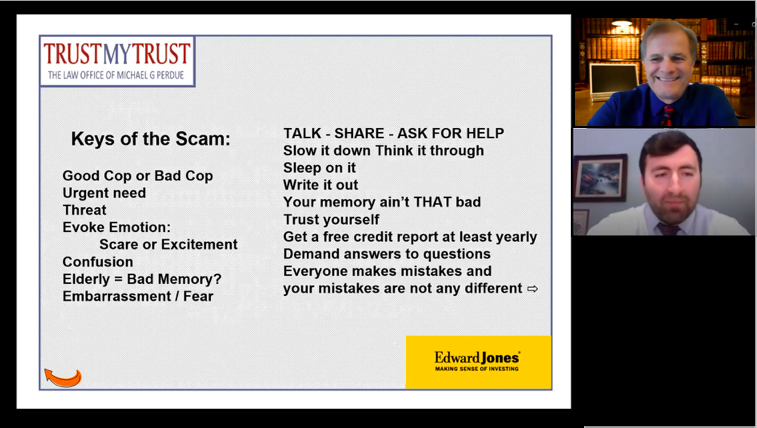
Attorney Mike Perdue and Edward Jones Financial Advisor Jonathan Laliberte discuss handling financial scams.
Anyone can be scammed. This topic interests Mike because he almost became a scam victim. He received $25,000 check and something felt weird it. He learned about a check scam from another attorney. If you are scammed, let everyone know. Don’t be embarrassed! Stop scammers by telling others! Then, just relax.
The presentation covered several scammer tricks:
- Sweetheart scam: This long-term scam focuses on someone who is lonely. Crooks tell sob stories and say, “You are my last hope.” They ask for a few dollars and move to higher money amounts. Everyone should know if it looks too good to be true; it isn’t true. Always ask questions.
- Grandparents: A caller says a grandchild needs help. They usually call the grandmother by wrong nickname (granny, grams, etc), have immediate trouble wanting wired money, and actually try to get your grandchild’s name from you. What should grandma do? Use a fake grandchild name, get details, don’t wire money, and tell parents.
- Government scams: This is usually phone call stating there is a court fine, an open warrant or something court-related. Scammers also use social security, land certificate or IRS calls/letters. So always pay or check status online. Don’t give away SS#, passwords, PIN or other secret information.
- Collections: This one threatens you with lawsuits or collections. It is a fraud if they ask you to ID yourself, give your ID or want your PIN numbers. Only give vital information when you call collection agencies when you have confirmed phone number online.
At this point in the presentation, Rotary President Steve Abbott shared a joke about the Nigerian Prince.
- Lottery/Sweepstakes: This one is similar to the infamous Nigerian Prince email. It is usually a contest you didn’t enter or a company you don’t have a business relationship.
- Home Services: Vendor asks for an excessive amount for work that doesn’t make sense. It is very urgent! Always get several bids, check licenses, and independently verify.
- Computers and Internet: This comes in emails with “xyz” or similar addresses with a fake link, computer repair calls or scam web sites. Windows and Apple do not call you! If you are on the wrong site, click away or shut down your computer.

Attorney Mike Perdue and Edward Jones Financial Advisor Jonathan Laliberte show the methods for stopping these frauds.
During the Q&A, questions brought about another phone scam. If you say, “Yes,” the calling system acts as if you have agreed to something. Blocking and unsubscribing doesn’t help. Unsubscribing puts you in their phone system. Avoid sharing information. Be careful when engaging the caller. It is a monstrous worldwide problem coming from places like China and Estonia that has yet to be solved.

Our upcoming new member, Mike Bett, enjoyed his first presentation with our Rotary!

